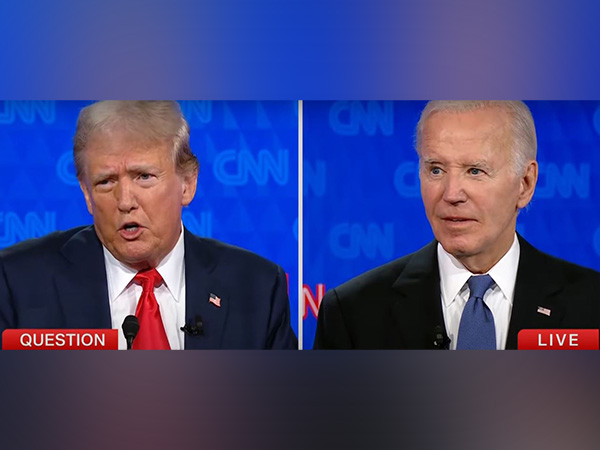Global Reactions to Biden's Debate Performance: Is Trump 2.0 Inevitable?
Joe Biden's shaky debate performance sparked global calls for him to step aside, boosting Donald Trump's prospects. Analysts and global leaders expressed concerns over Biden's age and capabilities, while allies like Japan and Germany began preparing for a potential Trump return. The debate intensified anxieties related to U.S. international relations and trade policies.

Joe Biden's shaky performance in the U.S. presidential debate drew stunned global reactions on Friday, prompting public calls for him to step aside and likely leaving some of America's closest allies steeling for Donald Trump's return. Biden's supporters had hoped Thursday's debate would erase worries that he was too old to serve but footage of the president sounding hoarse and stumbling over his words boosted Trump, said politicians, analysts and investors.
Global newspapers were also damning. France's Le Monde compared Biden to a shipwreck. Britain's left-leaning Daily Mirror called his performance a "gaffe-strewn nightmare". Germany's Bild newspaper ran with "Good night, Joe!" and the Sydney Morning Herald said "Trump monstered Biden. The Democrats can't win with Joe." "Joe Biden can't do it," said Matteo Renzi, a centrist who was close to the Democrats while serving as Italy's prime minister.
Renzi said on X that Biden had served the United States with honour, adding: "He doesn't deserve an inglorious ending, he doesn't deserve one. Changing horses is a duty for everyone." For Japan and South Korea, among the closest U.S. allies in Asia, relations with Trump's administration were at times strained by his demands for more payments towards military assistance and by trade tensions.
Countries including Japan and Germany have started laying the groundwork for a possible Trump return as his campaign gathered steam. "Mr Trump didn't win but Mr Biden might have imploded," said Kunihiko Miyake, a Japanese former diplomat and now research director at the Canon Institute for Global Studies, a think tank.
"Unlike eight years ago, we are much more prepared, as are other European and Asian allies. Still, Mr Trump is unpredictable." Peter Lee, research fellow at the Asan Institute for Policy Studies in Seoul, said he expected Trump to be "very tough" second time around in pressuring allies to increase defence spending.
As president, Trump started a tariff war with China, and has floated tariffs of 60% or higher on all Chinese goods if he wins the Nov. 5 election. Overseas firms dependent on U.S. markets, such as automakers, would be wary of the heightened possibility of Trump's return given the "myriad" of tariff-related policies he imposed during his previous term, said Lee Jae-il, analyst at Eugene Investment & Securities.
Stephen Lee, chief economist at Meritz Securities in Seoul, said Trump "might not just target China but impose tariffs against other countries as well under the concept of American exceptionalism." WAR IN UKRAINE
In Europe, Trump's criticisms of NATO and demands that other members pay more dominated his previous administration. His scepticism towards NATO is causing further anxiety as Russia's war in Ukraine continues. "American democracy killed before our eyes by gerontocracy!" said Guy Verhofstadt, a member of the European parliament and a former prime minister of Belgium who posted pictures of Biden and Trump on X.
German Chancellor Olaf Scholz previously cheered on Biden's prospects for re-election, but a senior defence figure in the ruling coalition lamented Biden's performance and urged Democrats to find another candidate. "The fact that a man like Trump could become president again because the Democrats are unable to put up a strong candidate against him would be a historic tragedy that the whole world would feel," Marie-Agnes Strack-Zimmermann, of the liberal FDP party, told the Rheinische Post paper.
A spokesperson for Scholz did not comment on the specifics of the debate, but said the chancellor valued Biden highly and had never spoken to Trump as their terms did not overlap. During the debate, Trump accused Biden of not standing up to China on trade. He also said China's Xi Jinping, North Korea's Kim Jong Un and Russia's Vladimir Putin "don't respect" Biden and that he was driving the country "into World War Three".
Biden retorted by saying Trump's tariff proposals would result in higher costs for American consumers, and that he "cuddles up" to the likes of Kim and Putin. Putin has said it made little difference to Russia who was in the White House. On Friday, the Kremlin declined comment on what it said was an internal U.S. matter.
Keir Starmer, leader of the British Labour party that leads polls before a July 4 election, said Britain's relationship with the U.S. was strong and "above the individuals." In Sydney, several Australian officials and experts had attended a workshop titled "Trump 2.0" as the debate was aired.
"The overwhelming feeling from today is that it was a disaster for Biden," said Peter Dean, a professor at the United States Studies Centre in Sydney who was at the workshop. "The mood has changed considerably after the debate and the general view is that if you weren't preparing for a Trump 2.0 then that is the smart play and the smart move now."
(This story has not been edited by Devdiscourse staff and is auto-generated from a syndicated feed.)
ALSO READ
From Social Media Stars to European Parliament Members: How Fidias and Alvise Revolutionized Politics
BJP Criticizes Congress over Dynastic Politics Amid Gandhi Sibling Seat Switch
BJP Accuses Congress of Dynastic Politics Amid Wayanad Seat Shuffle
Mbappe's Vote Call Stirs Controversy in French Politics
Thaksin Shinawatra Granted Bail: Thai Politics in Turmoil










